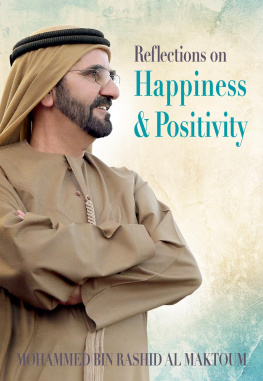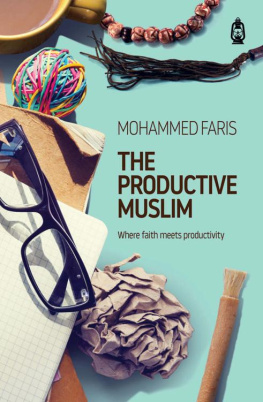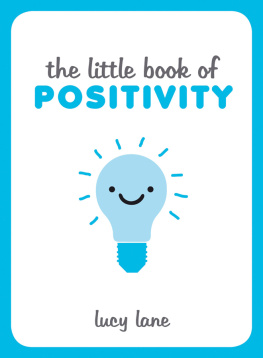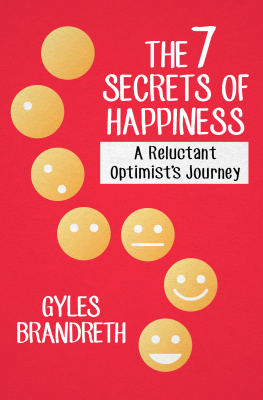
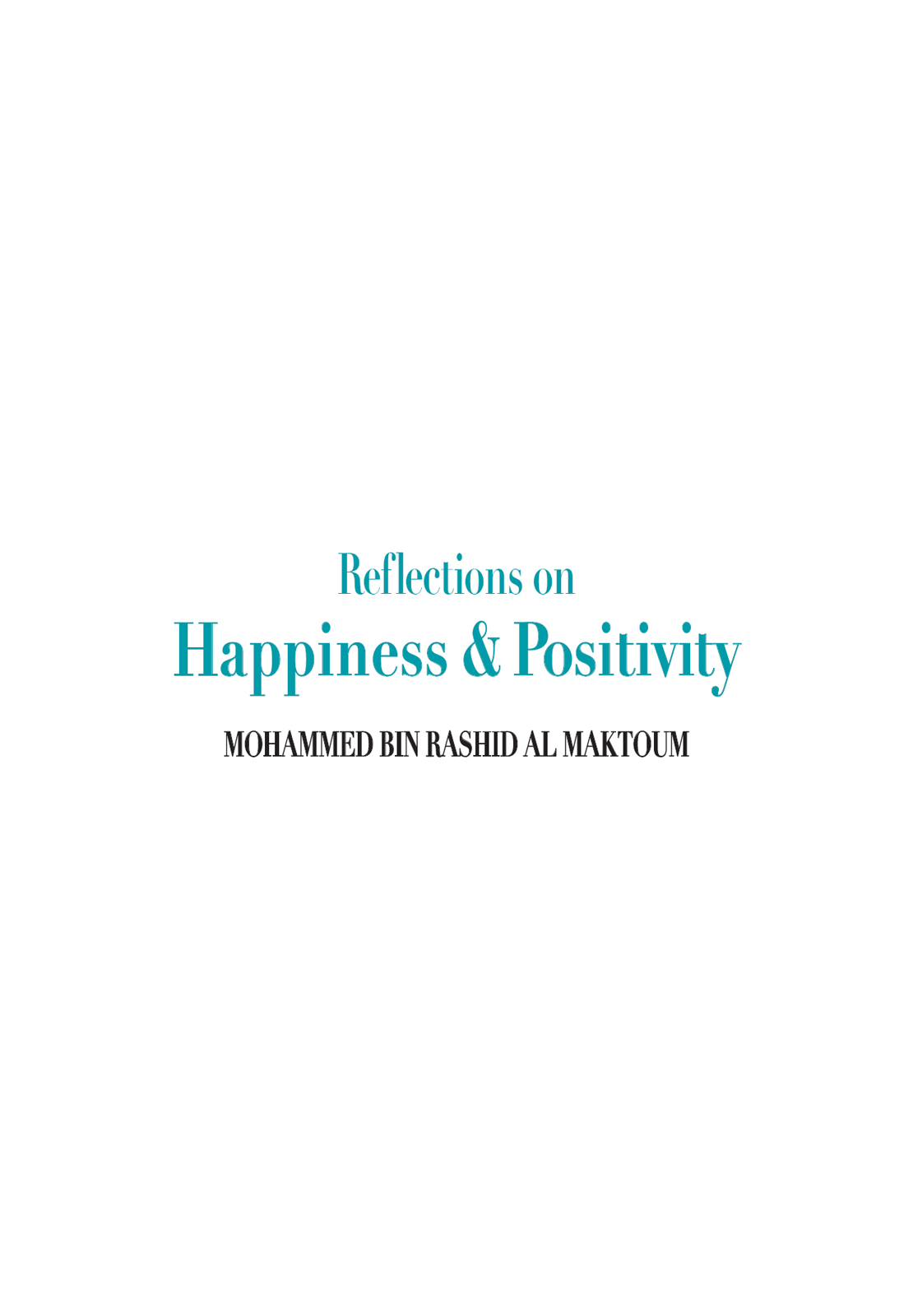
Reflections on Happiness & Positivity
First Edition February 2017

All rights are reserved by
the Executive Office of H.H. Sheikh Mohammed Bin Rashid Al Maktoum

Published By
Explorer Publishing & Distribution
PO Box 34275, Dubai, UAE
+971 (4) 340 8805
askexplorer.com
National Media Council Approval Number 187435
ISBN 978-1-78596-041-3
All rights reserved. No reproduction of any part of the present publication is allowed, nor is it allowed to archive or copy it in any way whatsoever, whether electronically, mechanically or by copying or saving, or otherwise without obtaining the permission of the Executive Office of His Highness Sheikh Mohammed Bin Rashid Al Maktoum.
Happiness & Positivity
Positivity is a way of thinking, and happiness is a lifestyle. In other words, it is not what you own or do that makes you happy; it is how you think about things.
Introduction
I have always had and still have a great interest in the concepts of happiness and positivity in life. These seemingly simple ideas have huge effects on many of our decisions and judgments, our relationships with those around us and also, their role in our view of the challenges we face, their contribution to many of our successes and to the achievement of our happiness as individuals, as nations and as peoples.
In this book, which aims to be succinct and easy to read, I wanted to discuss the concepts of happiness and positivity from new and different angles and perspectives. I have compiled a number of administrative reflections on happiness and positivity and their effect on achievement, productivity and creativity. I examine their roles in reinforcing team spirit and how they can be used in planning, creating policies, developing services, their importance to leaders in forming visions and strategies, as well as other positive effects in achieving administrative and leadership success.
I have tried to present all this in an easy and simple format, drawing on stories and situations from my own experience, contact with individuals involved in many activities and achievements, and from what I have read and heard as well as what I have witnessed from peoples lives and successes.
This book and others are part of our duty towards our young generations, towards our sons and daughters, brothers and sisters. It lies with us to teach them the arts and lessons of life and to transfer our expertise and experiences to them, for the way to repay our education is to educate others, the way to foster wisdom is to spread it, and the way to increase knowledge is to share it, critique it, and form our thoughts around it.
I ask God to guide everyone towards wisdom and righteousness in speech and work, and pray this work benefits its reader. God is the one who grants success and guides us to the right path.
Mohammed Bin Rashid Al Maktoum
Contents
One frequently asked question, particularly in the last few years of the governments operation, is Why focus on happiness? Why did happiness become an important part of the nations discourse, of my language and of the governments agenda, initiatives and activities?
It is a recurring question, and throughout this book, I shall attempt to answer it. I have paired happiness with positivity, a theme the reader will note that I elaborate on in the chapters to come.
I have often asked myself this question why happiness? Although it seems like a simple deliberation, it carries great depth and so is very difficult to answer.
I also ask myself, in an attempt to summarise my role as a leader in the UAE and Dubai, about my true function as a ruler. What is my main task? To run the government? What, then, is the function of government? Is it to enact and enforce laws and policies? Is it to protect gains and uphold rights? Is it to provide society with lifes necessities, such as health, education, accommodation, roads and infrastructure? Can government not have a wider, deeper and more inspirational function?
My response is yes; our work can be more profound, influential and inspiring when we seek to make people happy. The role of government is to create the environment through which people can achieve their dreams and ambitions and do it for themselves. Our part is to create this environment and not to control it. The job of government is to empower people, not to have the power over them. The job of government is to achieve happiness.
Can we imagine the impact these beliefs could have on the hundreds of thousands of people working in government? The realisation that their jobs have this great meaning; that their jobs have this civilised and deep humanitarian purpose; that they wake up every day with a direction to follow that is close to their hearts as human beings: how can they contribute to peoples happiness?
Some people dedicate their careers to working within a governmental system and, when they look back after 30 or 40 years of public service, they are rightly proud that they spent their whole lives in a constant quest to make people happy.
Seeking to make people happy is the embodiment of happiness itself. In Islam, bringing happiness to humans is one of the greatest acts and the most gracious people are recognised as those who are the most beneficial to others.
Let us also imagine the response of the people when they hear these answers. They understand that the government is working for their benefit, seeking to provide opportunities for them and for their children so they may be happy, and aiming to empower them with the tools and skills to fulfil their dreams. Could we conceive of the presence of any kind of hostility between governments and their people if the prime factor driving them all were achieving true happiness?
We are neither dreamers nor perfect beings, and we are not the first to discuss the value of happiness. People have pondered over and sought happiness throughout history. Almost 2,400 years ago, Aristotle said that the purpose of government was to achieve happiness. He posited that the government was a living creature that evolved and sought to achieve moral perfection and the happiness of individuals. The famous 15th century Arab historiographer Ibn Khaldun was, among others, of the same view. The United States of Americas Declaration of Independence guarantees the right for everyone to pursue happiness. There are calls from the United Nations (UN) to amend the standards adopted for the measurement of governments performance, from economic metrics to benchmarks related to human happiness. The UN has even named a world day to confirm the importance of happiness.
Happy people produce more, live longer and are better drivers of economic development according to many studies. I am surprised by some peoples perplexity in hearing the government talk about happiness. Happiness has indices, programmes and studies. Happiness is measurable; it can be nurtured and attributed to a group of values and initiatives. The future happiness and optimism of individuals, families, employees and the wider community need to be the focus of programmes and initiatives across all governmental sectors. When we say that the governments purpose is to achieve happiness, we mean it literally, and we will implement it literally. We seek to achieve this goal in line with our peoples ambitions and aspirations, and in accordance with our culture.
Next page
